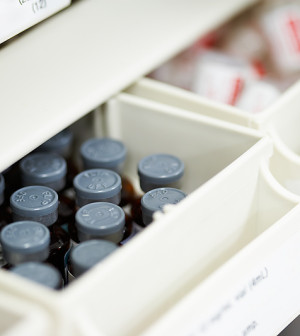- 7 Best Breads for Maintaining Stable Blood Sugar
- Gelatin vs. Collagen: Which is Best for Skin, Nails, and Joints?
- The Long-Term Effects of Daily Turmeric Supplements on Liver Health
- Could Your Grocery Store Meat Be Causing Recurring UTIs?
- Are You Making This Expensive Thermostat Error This Winter?
- Recognizing the Signs of Hypothyroidism
- 10 Strategies to Overcome Insomnia
- Could Artificial Sweeteners Be Aging the Brain Faster?
- Techniques for Soothing Your Nervous System
- Does the Water in Your House Smell Funny? Here’s Why
Higher-Dose, Short-Duration Radiation Better for Early Breast Cancer: Study


A shorter course of radiation therapy is better for women with early stage breast cancer, according to a new study.
Specifically, it found that those who received higher doses of whole breast radiation over a shorter period of time had fewer side effects and a better quality of life than those who received smaller doses of radiation over a longer period of time.
“Patients who received the shorter course reported less difficulty in caring for their families’ needs. This is a major priority for women undergoing breast cancer radiation,” study first author Dr. Simona Shaitelman, from the University of Texas MD Anderson Cancer Center, said in a center news release.
“Most are busy working mothers, working inside or outside the home, and are juggling a number of priorities. It’s paramount that we address this need,” explained Shaitelman, who is an assistant professor of radiation oncology.
The study was published Aug. 6 in the journal JAMA Oncology.
Doctors should use this higher-dose approach — called hypofractionated whole breast irradiation — as a starting point when discussing treatment options with breast cancer patients, researchers said.
Radiation therapy for breast cancer in the United States is generally given in smaller doses over a longer period of time. This method is called conventionally fractionated whole breast irradiation.
Only one-third of patients who should undergo the new, higher-dose treatment according to American Society of Radiation Oncology guidelines actually receive it, the researchers said.
Their study included nearly 300 women with early breast cancer (stages 0-2). The women were all 40 or older. They had undergone breast conserving surgery (“lumpectomy”) and were randomly assigned to receive either the hypofractionated radiation or conventional radiation.
During treatment, those in the higher-dose radiation group had fewer radiation-related side effects such as breast pain, eczema, skin darkening and fatigue than those in the conventional group. Six months after treatment, patients in the hypofractionated group had less fatigue and were better able to care for their families than those in the conventional group.
Dr. Stephanie Bernik is chief of surgical oncology at Lenox Hill Hospital in New York City. She said, “[This study] suggests that women who undergo the accelerated radiation not only benefit from the shorter length of time for treatment, but they also suffer less severe side effects. Women should discuss with their doctor if they are candidates for this type of therapy due to the benefits it offers.”
Dr. Benjamin Smith is the study’s corresponding author and an associate professor of radiation oncology at MD Anderson. “This study fills in a missing piece in the literature,” he said in the news release. “No longer do I regard the shorter course of treatment as just an option for patients, but rather the preferred starting point for discussion with patients if they need whole breast radiation.”
More information
The U.S. National Cancer Institute has more about breast cancer treatment.
Source: HealthDay
Copyright © 2026 HealthDay. All rights reserved.










